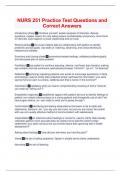NURS 251 Practice Test Questions and
Correct Answers
Introductory phase✅introduce yourself, explain purpose of interview, discuss
questions, explain reason for note taking assure confidentiality and privacy, time frame
of interview, build rapport (a close relationship built on trust)
Working phase✅the nurse collects data by collaborating with patient to identify
problems and set goals. Use skills of: listening, observing, and critical thinking to
interpret and validate
Summary and closing phase✅summarize/restate feelings, validates problems/goals,
and discusses plan to solve problem
Facilitation✅cue patient to continue (pausing, silence, nod head, lean forward, making
eye contact) and use continuers (well-placed phrases) "mhhmm", "go on", "im listening"
Reflection✅(echoing) repeating patients own words to encourage expression of facts
and feelings; used to clarify data collected-simply rephrase the information "you were
saying that your pain is a sharp, stabbing pain that is worse in the evening?"
Clarification✅validating what you heard, comprehending meaning of terms "what do
you mean by "falling out"?"
Empathetic responses✅establishes rapport with patient; be sure to identify feelings of
patient; non-verbal (offering tissue to a crying patient) and therapeutic use of self ("ive
had surgery before, so i can relate to what you're going through")
Confrontation✅identifying and stating observations that seem to be at odds with
statements, behavior, etc. "you say you dont care, but yet you are crying" be careful
with use-not usually effective method of communication with adolescents
Interpretation✅an inference about feelings or concerns, used to clarify data already
collected; gathers more accurate data; be careful not to lead the client to false
statements "you seem anxious-are you worried about that upcoming test in health
assessment?"
Asking about feelings✅"how did you feel when you had this pain?"
Verbal✅the art of asking questions. Speak in simple terms clients understand
Nonverbal✅the art of listening
, Demeanor✅enter room with professional poise; calm, undistracted; focus attention to
patient-do not overwhelm client by invading personal space
Facial expressions✅show what we are really thinking; neutral expression: right
expression for situation (smile, concern, understanding)
Attitude✅appear neutral, and non judgemental; accepting/understanding of situation
Silence✅allows clients and interviewer time to collect thoughts, take notes, and reflect
to ensure accurate data collection
Listening✅active listening is concentrating on client's response and subtitles;
techniques: good eye contact, smile/appropriate facial expressions, openness: body
position and mind, sit down
Avoid✅closed body posture, excessive or insufficient eye contact, distraction or
distance, standing
Direct question✅proceed from general to specific "tell me about your pain. Where did
you feel it? Show me. Anywhere else?"
-do not ask leading questions; only use open-ended questions requiring a description-
not yes or no answers
-ask questions requiring a graded response "what activities do you do that causes you
to have pain in your legs"
-ask multiple choice questions "is your pain sharp, dull, aching, burning, squeezing?"
-ask one question at a time, dont confuse patient
-use language that is understandable and appropriate
Open-ended questions✅used to elicit feelings or perceptions
-ask "how" or "what" questions
Close-ended questions✅used to focus on specific information, precise data
-ask "when" or "did" questions
-helps keep interview on course
-use if limited time and client gets easily distracted
-downfall-may miss something-answer specifically to question
Laundry list✅multiple choice: used to obtain specific answers and prevent any
unexpected answers. Ask simple specific choices for answers
Sensitive topics✅alcohol and drug use, physical violence/abuse, sexual history,
psychiatric problems mental illness, depression, etc.




